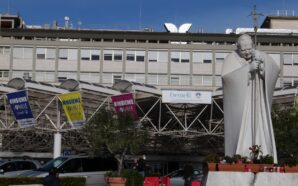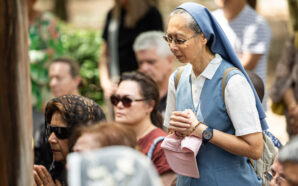Contrary to what some believe, Pope Francis’ did not invent the Vatican’s policy on accepting immigrants and refugees
There’s probably no pope who is associated with the question of migration more than Pope Francis, the Argentine-born son of Italian immigrants.
And throughout his pontificate, he has intensified his advocacy on behalf of migrants since his visit to the Island of Lampedusa in 2013, just five months after his election as Bishop of Rome.
“Of course there is a break in style, but in substance, Francis says the same thing as his predecessors,” assures Father Christian Mellon, a Jesuit member of the Centre for Research and Social Action (CERAS) in Paris.
In other words, Francis did not invent the Church’s concern or policy on immigrants.
It was Benedict XV who established the annual observance of the World Day of Migrants and Refugees back in 1914 — over a hundred year ago.
Pius XII then issued the first major Vatican document on the issue of migration with his 1952 encyclical, Exsul familia nazarathana.
He outlined a positive vision of migration, calling for “the more favourable distribution of men on the earth’s surface suitable to colonies of agricultural workers”.
In the decades that followed, the harsh living conditions of migrant workers led to a change in this optimism.
John Paul II presented migration as a “necessary evil” in his 1981 encyclical, Laborem Exercens.
While he defended the right of every person to migrate freely, the Polish pope insisted that people had a “right not to have to migrate”.
The Catechism of the Catholic Church (art. 2241) notes that “forced migrations” regard those who are searching for “security” for a better “means of livelihood” (which seems to be similar to so-called “economic” migrations).
The CCC says “more prosperous nations” have a duty to welcome such migrants as part of the moral imperative to protect life.
Paul VI made it clear in his 1969 “motu proprio” Pastoralis migratorum cura that states can regulate access to their territory when it is not a question of forced migration, but only as an exception to the general principle, which remains the freedom to migrate.
“The Catholic authorities do not advocate a total opening of the borders; but they deplore the fact that what should remain the exception has increasingly become the rule,” explains Father Mellon.
The radical positions taken by some popes may come as a surprise today. No doubt it has been forgotten that as early as 1996, John Paul II addressed the sensitive issue of illegal immigrants, asking that they be “recognised and welcomed as brothers” in the Church.
John Paul II said the response to the biblical question, “What have you done with your brother?”, should not be given “within the limits of the law, but with a view to solidarity”.
In doing so, he opened the way to civil disobedience.
Mélinée le Priol is a journalist for LA CROIX France. She was a correspondent in the Palestinian Territories between 2014 and 2017, writing for prominent French dailies including La Croix, Le Parisien and Ouest-France. She has a particular interest for topics related to the Middle-East but also more widely religious news and in particular the Catholic Church.
Reproduced with permission from La Croix International.







